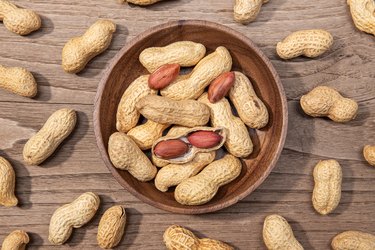
For all their healthful benefits, peanuts can cause unpleasant symptoms, even when you're not actually allergic to them. If you suspect that they've become a digestive issue for you, here's what you need to know.
The Peanut-Diarrhea Link
Video of the Day
Having loose, watery and more frequent bowel movements is a telltale sign that you're dealing with diarrhea. But how can you determine if eating peanuts is making you poop, and possibly triggering IBS (irritable bowel syndrome) symptoms?
Video of the Day
As you age, sensitivities to certain foods can affect your digestive system and result in diarrhea, according to an April 2017 review in Aging and Disease. And that can happen even if it was a food you could previously tolerate.
Know, too, that FODMAPs (the acronym for fermentable oligosaccharides, disaccharides, monosaccharides and polyols) are a group of poorly digested sugars that can cause diarrhea, according to Harvard Health Publishing. Fructose, artificial sweeteners, lactose, wheat and legumes are examples of foods that fall within this FODMAP group.
"Most legumes contain high levels of oligosaccharides, a carbohydrate, which may trigger symptoms in those with IBS. However, peanuts are a low FODMAP food which means they can be a great legume for IBS sufferers to include in their diet." says Megan Hilbert, RDN, a registered dietitian nutritionist and creator of the blog "Dishing Nutrition."
"Despite not containing these typical carbohydrates that can cause gas, bloating, pain and diarrhea, it's possible to still have negative gastrointestinal side effects if you have an intolerance and are unable to break down the proteins in peanuts adequately," Hilbert says.
Peanuts are one of the top foods that commonly cause allergic reactions, along with eggs, milk, soy, wheat, shellfish and tree nuts. Harvard Health Publishing states that if you do have an allergy to a certain food, you will notice a reaction within 30 minutes of eating that food.
Reaction times can last for as little as five to 10 minutes or as long as four to six hours, says Harvard Health. If you're experiencing an allergy to peanuts, other symptoms that may come along with diarrhea include hives, lip and tongue swelling and difficulty swallowing.
If you're only experiencing diarrhea and gastrointestinal upset, you may just have an intolerance or sensitivity to peanuts. An intolerance is different than an allergy in that you're not allergic but still have a physical reaction to the food due to difficulties digesting it, adds Harvard Health.
A good rule of thumb is to keep a food journal of everything you eat and drink to identify a pattern of foods or beverages that seem to trigger diarrhea, suggests Harvard Health. It's also important to see your doctor to ensure your symptoms are not caused by something else.
"If you suspect you are experiencing symptoms of a peanut intolerance, it's best to speak to your health care team to get an understanding of the severity of this to help manage symptoms," Hilbert says. "IBS intolerances are very individualized, and no two patients are alike."
Easing Your Diarrhea
There are also steps you can take to ease diarrhea as well as rule out peanuts as the cause. According to the Mayo Clinic, some causes of diarrhea include:
- Viruses, bacteria and parasites from contaminated food or water
- Certain medications, such as antibiotics
- Lactose intolerance and other food allergies or sensitivities
- Artificial sweeteners
- Digestive disorders, including IBS, Crohn's disease and ulcerative colitis
Harvard Health Publishing recommends preventing diarrhea by practicing good hygiene. Ensure that you are washing your hands frequently with soap and water, especially before cooking or eating food. Because diarrhea can also be caused by food poisoning, it's recommended to avoid eating undercooked meats, raw seafood or food that has been left at room temperature for several hours.
When you begin to notice symptoms of diarrhea, there are several treatment options to implement. Ensure that you are getting enough rest and switch to a diet of clear liquids to avoid becoming dehydrated. Drinking sports drinks will replenish the loss of fluids and electrolytes, notes Harvard Health.
As symptoms start to get better, Harvard Health recommends that you gradually incorporate solid foods. Start with softer, easy-to-digest foods such as applesauce, cooked cereal or steamed rice.
- Megan Hilbert, RDN, registered dietitian nutritionist and "Dishing Nutrition" blogger
- Harvard Health Publishing: "Diarrhea"
- Harvard Health Publishing: "Is Something in Your Diet Causing Diarrhea?"
- Harvard Health Publishing: "Food Allergy"
- Mayo Clinic: "Diarrhea"
- Aging and Disease: "Allergy and Aging: An Old/New Emerging Health Issue"
Is this an emergency? If you are experiencing serious medical symptoms, please see the National Library of Medicine’s list of signs you need emergency medical attention or call 911.